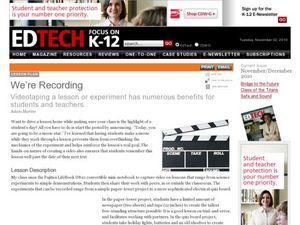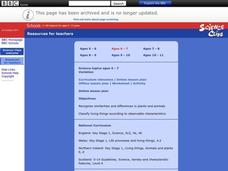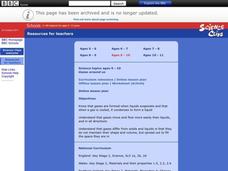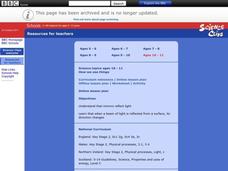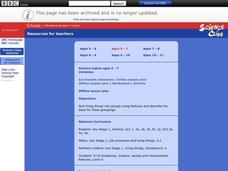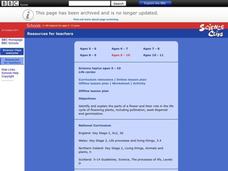Curated OER
The Discovery of Ohm's Law
Students study Georg Ohm and how he changed mathematics with his law. In this experimental evidence and stastics lesson students complete an experiment on the characteristics of Ohm's law.
Curated OER
TE Lesson: Navigating at the Speed of Satellites
Middle schoolers study the basic concepts of the Global Positioning System and how it increases the accuracy of navigation. They examine trilateration and how the speed of light is used to calculate distances.
Curated OER
Making Energy "trails"
Students explore ten different stations that demonstrate either chemical, kinetic, or mechanical energy. They examine the way energy is transferred during each station's hands-on activity. Stations include vinegar and baking soda,...
Curated OER
Hot Friction
Sixth graders use small electronic devices known as thermistors to measure the temperature beneath an object such as a coffee cup as it slides across a surface. By choosing different surfaces, 6th graders can compare in a quantitative...
Curated OER
We're Recording
Students record their experiments or lessons using a video camera. In this technology lesson plan, students explain to the camera what they have learned. They watch these together to help reinforce a lesson plan.
Curated OER
Incorporating Artifacts and Guest Speakers into Curriculum Planning
Artifacts and guest speakers are enriching and exciting for your students.
Curated OER
Ourselves
Students use a website to name and compare external body parts of humans and other animals.
Curated OER
Sound and Hearing - Internet Research
Pupils use a website to help them recognize that sound is generated in a variety of ways and from different sources. They determine that sounds vary in tone and loudness, and learn there are different ways to describe sound.
Curated OER
Moving and Growing
Learners know that humans and some other animals have bony skeletons inside their body. They know that other animals have skeletons on the outside of their bodies. They explain the role of both kinds of skeletons.
Curated OER
Variation
Learners participate in an online lesson to reinforce the similarities and differences in plants and animals. They classify living things according to observable characteristics.
Curated OER
Gases Around Us
Students participate in an online lesson showing that gases are formed when liquids evaporate and that when a gas is cooled, it condenses to form a liquid, and gases move and flow more easily than liquids, and how gases differ from solids.
Curated OER
Changing State
Students participate in an online lesson to investigate the effects of cooling and heating on water.
Curated OER
Changing Sounds
Students identify how the pitch and the loudness of an instrument can be altered by examining the sounds made by three instruments.
Curated OER
Helping Plants Grow Well
Students explain the effect of water, temperature and light on plant growth.
Curated OER
Micro-organisms
Students examine how micro-organisms are living organisms that are often too small to be seen. They explain that micro-organisms may be beneficial or harmful.
Curated OER
Forces in Action
Students ask questions that can be investigated scientifically. They determine how to plan a fair test by changing one factor while keeping other factors the same, to use measurements to draw conclusions and use scientific knowledge to...
Curated OER
How We See Things
Students explain that mirrors reflect light. They examine how when a beam of light is reflected from a surface, its direction changes.
Curated OER
Variation
Students practice sorting living things into groups using their characteristics. Using pictures of leaves and animals, they sort them based on their color and shape and write the objects characteristics under the picture. They share...
Curated OER
Keeping Warm
Students place words describing a range from cold to hot on a scale. Using those words, they identify places on Earth which are cold, hot, freezing or boiling. They practice using and reading a thermometer with three different beakers...
Curated OER
Moving and Growing
Students work with a partner to brainstorm a list of as many human body parts as possible. Using that list, they circle any one of those that are bones. They are shown a model of the human skeleton and practice locating various bones. ...
Curated OER
Keeping Healthy
Students review what the heart does and why the muscles in the body need oxygen. As a class, they measure their pulse rate while they are resting and after they have jogged for three minutes. They are helped by their teacher to convert...
Curated OER
Grouping and Changing Materials
Students feel and observe different types of materials. Using the internet, they sort objects based on the materials they are made from and justify their reasons for putting it in a certain category. They identify objects that could...
Curated OER
Helping plants grow well
Students explore the effect of water, temperature and light on plant growth. Students are asked if they remember the LAW for plants. This is Light, Air(temperature) and Water, which all plants need for growth. Students are divided...
Curated OER
Life cycles
Students identify and explain the parts of a flower and their role in the life cycle of flowering plants, including pollination, seed dispersal, and germination. Students recap the following information: that plants need light, warmth,...
Other popular searches
- Basic Electricity Circuits
- Electricity Circuits Current
- Electricity Circuits Safety
- Basic Electricity and Circuits
- Circuits Electricity
- Electricity Circuits Project
- Electricity Circuits Proiect






